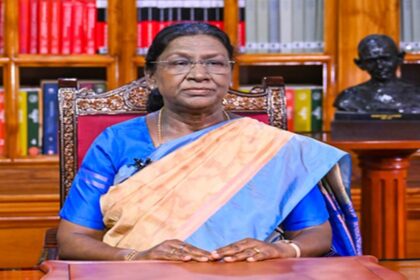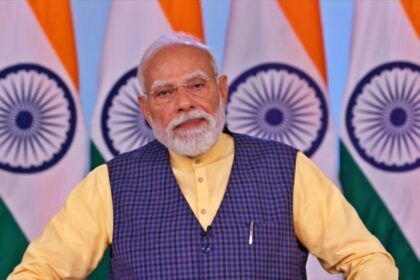EAM Jaishankar Slams Terrorism At SCO Meet, Cites Pahalgam Attack As Example
External Affairs Minister Dr. S. Jaishankar on Tuesday underscored the need for an uncompromising stand against terrorism, citing the recent terrorist attack in Pahalgam, India, which was condemned by the UN Security Council.
The Minister was speaking at the Shanghai Cooperation Organisation (SCO) Council of Foreign Ministers’ Meeting in Tianjin, China.
In a post on X, he highlighted the three evils – terrorism, separatism and extremism – which, he noted, often occur together. “Recently, we in India witnessed a graphic example in the terrorist attack in Pahalgam on 22 April 2025. It was deliberately conducted to undermine the tourism economy of Jammu and Kashmir while sowing a religious divide. The UN Security Council, of which some of us are currently members, issued a statement condemning it in the strongest terms and ‘underlined the need to hold perpetrators, organizers, financiers and sponsors of this reprehensible act of terrorism accountable and bring them to justice.’ We have since done exactly that and will continue to do so. It is imperative that the SCO, to remain true to its founding objectives, take an uncompromising position on this challenge,” he said.
Jaishankar reiterated India’s commitment to holding those responsible accountable and bringing them to justice.
He also stressed the need for SCO member states to work together to stabilise the global order, reduce risks, and address challenges that threaten collective interests amid growing conflicts, competition, and economic instability.
“In the last few years, we have seen more conflicts, competition and coercion. Economic instability is also visibly on the rise. The challenge before us is to stabilise the global order, de-risk various dimensions and, through it all, address longstanding challenges that threaten our collective interests,” Jaishankar said on X.
The minister emphasised that cooperation within the SCO must be based on mutual respect, sovereign equality, and adherence to the territorial integrity and sovereignty of member states. He also mentioned India’s initiatives in areas such as startup innovation, traditional medicine, and digital public infrastructure.
“India has taken several initiatives in the SCO in domains ranging from startups and innovation to traditional medicine and digital public infrastructure. We will continue to positively approach new ideas and proposals that are genuinely for our collective good. It is essential that such cooperation is based on mutual respect, sovereign equality, and in accordance with the territorial integrity and sovereignty of member states,” he said.
Jaishankar further noted the need to address issues such as the lack of assured transit within the SCO region to deepen collaboration and promote economic cooperation. He also highlighted the potential of the International North-South Transport Corridor (INSTC) to boost regional connectivity.
“Deepening collaboration within the SCO naturally requires more trade, investment, and exchanges. For that to move to the next level, it is imperative that we address some current issues. One of them is the lack of assured transit within the SCO space. Its absence undermines the seriousness of advocating cooperation in economic areas. Another is to ensure the promotion of the International North-South Transport Corridor (INSTC). We are confident that it will continue to gather momentum,” he added.
The minister stressed the need for the international community, particularly SCO members, to provide development assistance to Afghanistan, while ensuring regional stability and the well-being of the Afghan people.
“Afghanistan has long been on the SCO agenda. The compulsions of regional stability are buttressed by our longstanding concern for the well-being of the Afghan people. The international community, particularly SCO members, must therefore step up with development assistance. India, for its part, will certainly do so,” said Jaishankar.
He also highlighted the importance of effective groupings like the SCO in a multi-polar world, noting that their ability to shape world affairs depends on a shared agenda and collective effort.
“The world today is moving towards greater multi-polarity. This is not just in terms of the redistribution of national capacities, but also the emergence of effective groupings like the SCO. Our ability to contribute to the shaping of world affairs will naturally depend on how well we come together on a shared agenda. That means taking everybody on board,” he said.
During the meeting, Jaishankar held several high-level discussions on the sidelines of the SCO Foreign Ministers’ gathering.
He met his Russian counterpart, Sergey Lavrov, with Russia’s Foreign Ministry posting on X: “Russia’s Foreign Minister Sergey Lavrov and Minister of External Affairs of India @DrSJaishankar hold a meeting on the sidelines of the #SCO Council of Foreign Ministers meeting.”
He also met Iranian Foreign Minister Seyed Abbas Araghchi, posting on X: “Good to catch up with FM @araghchi of Iran, this time on the sidelines of the SCO Foreign Ministers Meeting in Tianjin.”
Jaishankar is on an official visit to China to attend the SCO Foreign Ministers’ Meeting, having arrived in Beijing after concluding his trip to Singapore. This is his first visit to China since the Galwan Valley clash in 2020, which severely strained ties between the two countries.
Earlier in the day, Jaishankar, along with other SCO foreign ministers, met Chinese President Xi Jinping.
His visit follows recent visits to China by Defence Minister Rajnath Singh and National Security Advisor (NSA) Ajit Doval, both of whom attended SCO-related engagements in June.










